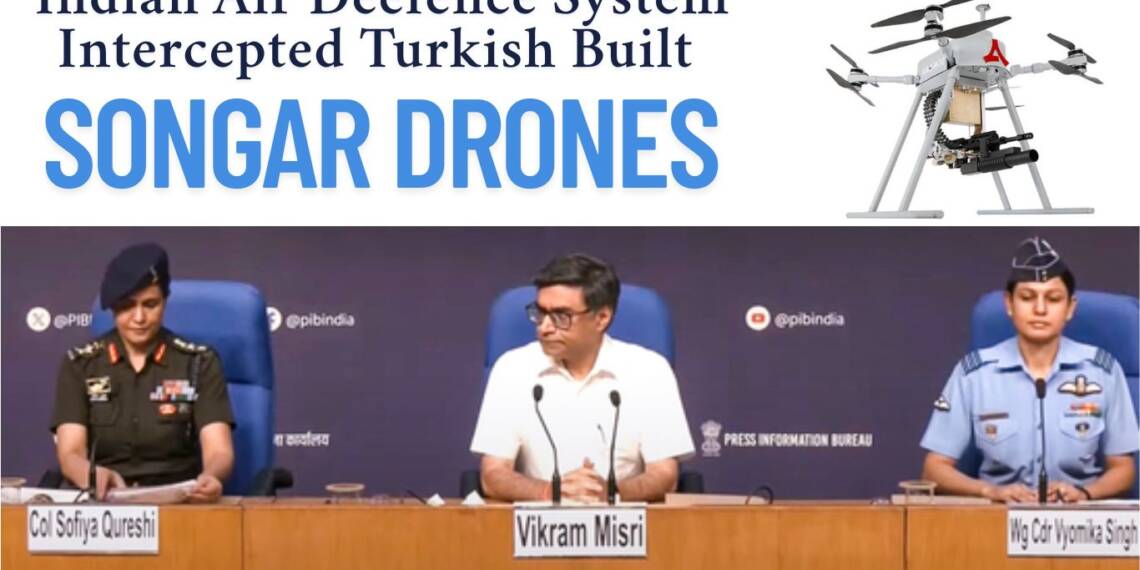In a deeply concerning escalation of hostilities, Pakistan has deployed Turkish-origin SONGAR drones in cross-border operations against India, marking a troubling new chapter in asymmetric warfare in South Asia. India’s Ministry of External Affairs (MEA), in a press briefing on May 9, confirmed the use of these armed drones following a wave of drone incursions that targeted both military and civilian infrastructure across Indian territory.
An Unprecedented Drone Offensive
According to official statements by Indian authorities, Pakistan launched over 400 drones on the intervening night of May 8-9, attempting infiltrations at 36 different locations inside India. Indian security forces successfully intercepted and shot down the majority of these UAVs using both kinetic and non-kinetic counter-drone measures. The sheer scale and coordination of this attack signal a new operational doctrine by Pakistan that heavily incorporates drone warfare.
The aggressive drone deployment came shortly after a C-130 Hercules aircraft was reported to have landed in Pakistan, suspected of transporting advanced Turkish military hardware. This suspicion is now near-confirmed, with forensic analysis of drone debris validating the use of Turkish-made ASISGUARD SONGAR drones.
What is the SONGAR Drone?
The SONGAR is a tactical armed unmanned aerial vehicle (UAV) developed by Turkish defense company ASISGUARD. It is designed for both urban combat and battlefield scenarios, seamlessly combining intelligence, surveillance, reconnaissance (ISR), and strike capabilities in one compact platform.
Firepower and Versatility
- Standard Armament: 5.56mm NATO machine gun (200-round capacity)
- Other Payload Options:
- 40mm grenade launcher
- Laser-guided mini-missiles (developed by TroyTech)
- Air-launched TOGAN 81mm mortars (developed by TÜBİTAK SAGE)
With burst fire, auto-targeting, and stabilized shooting, the SONGAR drone is engineered for high-precision strikes, urban combat, and even crowd control operations.
Tactical Specifications
- Mission range: Up to 10 km
- Flight time: 15–25 minutes (variable by payload/weather)
- Altitude ceiling: Up to 2,800 meters
- Weight: Approximately 45 kg (fully loaded)
- Sensors: Gimbal-mounted cameras, 10x optical zoom, HD thermal imaging (640×512)
- Navigation: GPS/GLONASS with return-to-base failsafe features
- Control Modes: Manual and semi-autonomous
Turkey-Pakistan Defence Collaboration
The SONGAR drone’s presence in Pakistani hands underscores the expanding Turkey-Pakistan military-industrial cooperation. Turkey had publicly announced the export of SONGAR drones in 2021, and while Pakistan’s official adoption of these UAVs had not been confirmed, recent events demonstrate their active deployment.
This collaboration raises critical geopolitical questions, particularly given Turkey’s NATO membership. The use of Turkish-origin drones by Pakistan — a country India accuses of harbouring and supporting terrorist groups — effectively implies a NATO member’s indirect complicity in armed aggression against a democratic state.
Operation Sindoor and Escalating Tensions
During the May 9 press conference, Foreign Secretary Vikram Misri, Colonel Sofia Qureshi, and Wing Commander Vyomika Singh briefed the media on the post-Operation Sindoor developments. The operation was launched after a major escalation from the Pakistani side when Pakistan-backed terrorists killed 26 innocent civilians in Pahalgam, a tourist spot in the Union territory of Jammu and Kashmir. India destroyed terrorist outfits in Pakistan-occupied Kashmir.
In retaliation, Pakistan launched attacks on India targeting not just military installations but also civilian and religious infrastructure, including temples, gurdwaras, and Christian convents. Colonel Qureshi confirmed the attempted infiltrations via drones and highlighted their targeting intent toward strategic Indian military infrastructure. The collected wreckage has been sent for detailed analysis, but early reports clearly point to ASISGUARD’s Turkish-made systems.
Turkish Drones, NATO, and the Credibility Crisis
The deployment of Turkish-made SONGAR drones by Pakistan in cross-border attacks against India is not just a regional security threat — it opens a Pandora’s box of geopolitical and ethical questions. Turkey’s role in arming Pakistan, a nation frequently accused of supporting terrorism, casts a long shadow over Ankara’s international commitments and raises urgent concerns about NATO’s internal coherence.
As a NATO member, Turkey’s actions contradict the alliance’s foundational principles, particularly in light of its historic role in the Global War on Terror post-9/11. The use of NATO-member state weapons in attacks against civilian and religious targets in India brings into question the moral and strategic consistency of Western nations and their defence partnerships.
Suppose NATO states remain silent or passive in the face of such developments. In that case, it risks being seen as complicit — or at least indifferent — to the enabling of terrorist proxies and asymmetric warfare. As the battlefield increasingly shifts towards drones and deniable assets, this incident must serve as a wake-up call for greater accountability in international arms transfers and a serious reassessment of strategic alliances that could embolden state-sponsored terrorism.
India, and indeed the global community, now faces the challenge of confronting not only cross-border terror, but also the international supply chains and political networks that empower it.








